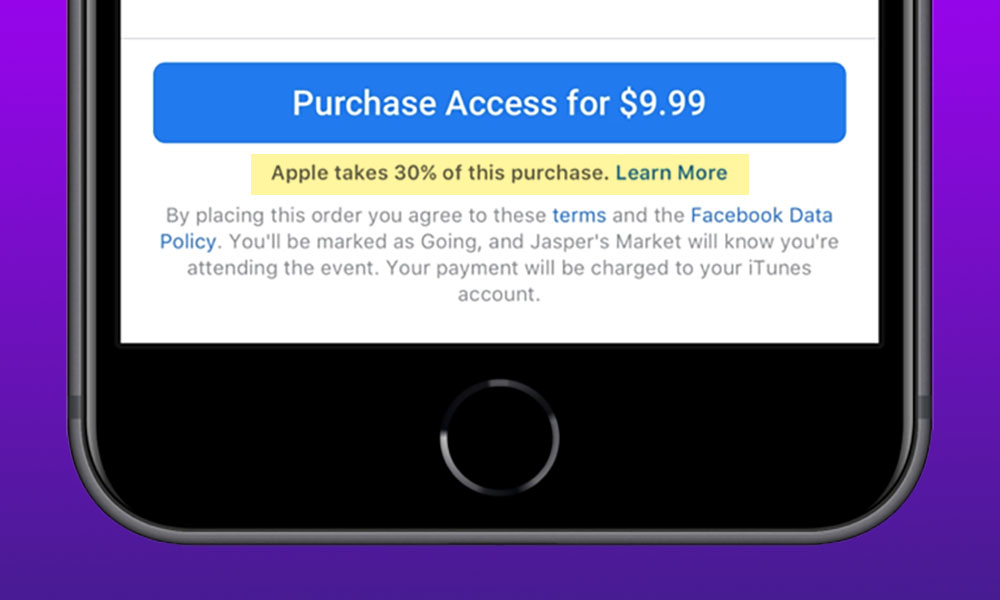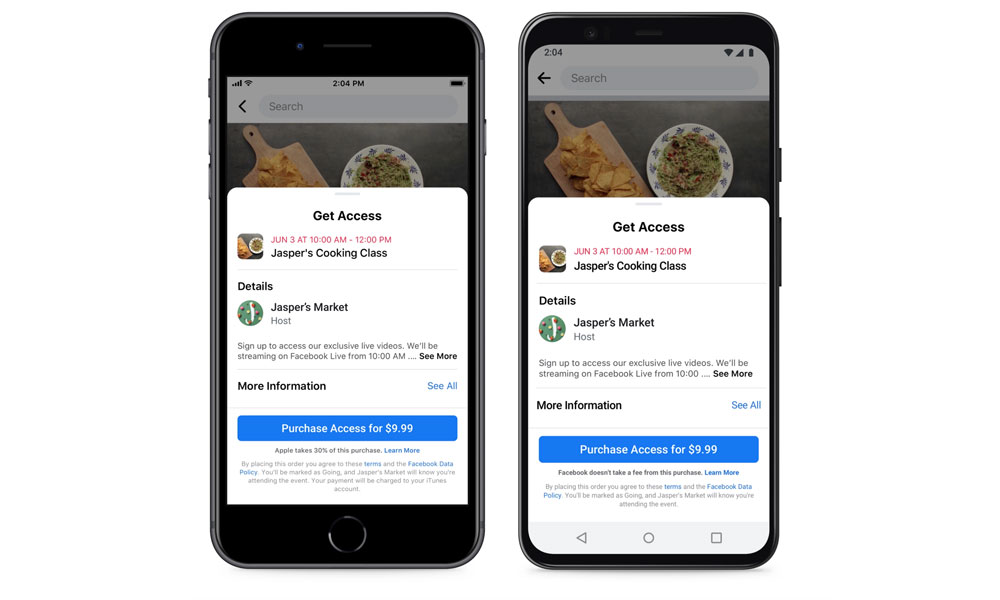Apple Rejects Facebook Update That Calls out 30% ‘App Store Tax’ in Support of Small Businesses
 Credit: Facebook
Credit: Facebook
Toggle Dark Mode
It probably wasn’t hard to see it coming, but Apple’s App Store review team has summarily rejected Facebook’s attempt to let users know about the 30 percent cut Apple is taking on virtual event purchases that are being offered to help out struggling small businesses.
This summer Facebook launched a new paid events feature, partly in response to the number of businesses that are struggling to attract physical customers during the novel coronavirus pandemic that’s been wreaking havoc with the world. The feature was intended to allow freelancers and small businesses to move to paid online events to help generate revenue in the midst of a drop in customers and even the inability to run their physical businesses at all right now.
In an unusually altruistic move for the social media giant, Facebook also promised that it would pass through 100% of the proceeds from these paid events back to the actual small business owners by waiving all of its normal fees for the next year. Facebook hoped to engender the same spirit of generosity in Apple, and approached the App Store team asking Apple to also forego its normal 30% commission for these purchases, either by making an exception to the normal revenue sharing from normal App Store payments or by allowing Facebook to use Facebook Pay for these transactions.
Unfortunately, Apple flatly refused, dismissing both requests according to Facebook, meaning that businesses would only get 70 percent of the monies from customers purchasing paid small business events on iPhones and iPads.
In response to Apple’s refusal, Facebook’s leadership felt that it was important to “be transparent” and make customers aware that in this case, not all of the money they think they’re paying to support small businesses is actually getting into the hands of the small business owners.
When people are paying $20 for an online event, they think it’s all going to a local business when 30% is going to an almost $2 trillion company — that’s relevant information for people to have.
Fidji Simo, Head of Facebook app
As a result, Facebook said that it would be adding a note to the purchasing screen in the next Facebook app update that would clearly state that “Apple takes 30% of this purchase” (by contrast, the note in the same place on the Android Facebook app would say “Facebook doesn’t take a fee from this purchase.”)
Facebook said last week that it had already submitted the revised app to Apple, but considering that Apple seems to do everything it can to avoid advertising the 30% cut that it takes from App Store purchases, we were very skeptical that Apple was going to allow this one to pass, and we’re not all that surprised that Facebook’s update got summarily rejected.
‘Irrelevant’ Information
According to what Facebook told Reuters yesterday, the update to the main Facebook app was unceremoniously rejected by Apple, although interestingly Apple’s App Store review team didn’t address the in-app payment notice directly.
Instead, they simply said that the information was “irrelevant” and therefore shouldn’t be shown to users, citing an App Store rule that prohibits extraneous information on payment screens.
Unfortunately Apple rejected our transparency notice around their 30% tax but we are still working to make that information available inside the app experience.
Facebook statement
It’s also worth noting that while Facebook said that it would offer a similar tag line on the Android app stating that it takes nothing from the purchase, Reuters found that hasn’t yet appeared either, although it remains unclear if that was also rejected by Google’s Play Store for some other reason, or if the change may simply not have been published yet.
What’s Going on Here?
To be clear, Apple has not banned the Facebook app in any way, nor taken any other action against Facebook other than simply refusing to accept the company’s latest update.
While this may sound similar to the fight being waged by Epic Games — and on some level it is insofar as Facebook is fighting Apple’s 30 percent take — the approaches the two companies are taking are fundamentally different, as are their motivations for waging their fights.
Although it was done at least partly as a dig at Apple’s App Store commission policies, Facebook pre-announced to the world that it would be adding this message to the Facebook app, and then very openly and transparently submitted the update with the message in place. Apple simply refused to accept the update, as it would any other that violated its rules. Whether the rules are reasonable or not is another matter entirely, of course, but the point is that Facebook followed them.
By contrast, Epic Games snuck a hidden feature into Fortnite to very deliberately bypass Apple’s in-app purchasing system, and then turned that feature on more or less behind Apple’s back — a blatantly deceptive practice on its part that not only got Fortnite banned from the App Store, but has Apple terminating Epic’s Fortnite developer account as a response to its dishonesty.
Had Epic submitted an update to Fortnite with the alternative in-app purchasing system clearly visible, it obviously would have been quickly rejected by Apple, but it’s also fair to say that Fortnite wouldn’t have been kicked off the App Store. Of course, if Epic refused to submit any further updates that followed Apple’s rules, Fortnite players would likely find themselves in the same situation as they are now — unable to access the new season — and of course Fortnite wouldn’t have nearly as big of a PR spectacle on its hands.
‘Rethinking the App Store’
The fact is, however, what Facebook is doing here actually makes a much better case than Epic does for why the App Store commission model isn’t being applied as fairly as it should be.
It’s hard to argue that Apple taking a 30 percent cut of a company that’s selling entirely virtual items is actually hurting that company in any way. Epic Games effectively sells vapourware, and while they obviously have costs involved with developing Fortnite and running its game servers, it has no material or tangible costs for the V Bucks that it sells in the game. In fact, there’s a strong case to be made that there’s no reason Apple shouldn’t be entitled to at least a portion of that based on its normal policies, and this is something that will likely be hotly debated in courts and coffee shops for the next few years as the Epic lawsuit continues.
On the other hand, what Facebook is doing here is not only a good thing, but it represents the kind of tangible costs that businesses encounter for many of the things that they’re now selling through in-app purchases.
It has always been Apple’s policy not to charge its App Store commission on physical goods and services, which is why you can buy things directly through the Amazon app, pay for rides with Uber, or order food from DoorDash without those businesses giving up 30 percent to Apple. Only “digital” goods and services — things like e-books, movies, streaming subscriptions, and in-game currency — are subject to Apple’s 30 percent cut.
However, recent events have blurred the line between a “physical” service and a “virtual” service, and Apple has picked the wrong side of that line to be on.
In his excellent essay, Rethinking the App Store, Ben Thompson illustrates how many small businesses have been negatively impacted by the sudden appears of the “Apple tax” as they shift services from in-person classes to virtual online seminars during a time period when so many businesses are being forced to go virtual in order to survive.
Citing a recent New York Times article, Thompson notes how both Airbnb and ClassPass providers suddenly found themselves in a more difficult situation as Apple began demanding its 30 percent cut of virtual classes.
With gyms shut down, ClassPass dropped its typical commission on virtual classes, passing along 100 percent of sales to gyms, the person close to the company said. That meant Apple would have taken its cut from hundreds of struggling independent fitness centers, yoga studios and boxing gyms.
The New York Times
In essence, ClassPass was doing the same thing that Facebook is trying to do here, except that in ClassPass’ case, it wasn’t even a new business model. The service had previously specialized in helping users schedule physical workout sessions — something for which Apple took no cut at all under its normal policies — whereas after many of its customers pivoted to virtual sessions in the midst of the pandemic, Apple suddenly wanted its 30 percent cut for what was effectively the same sort of thing.
While Apple insists that it’s only enforcing its policies consistently in the case of businesses like ClassPass it’s not hard to argue that the policies are simply wrong in this case and definitely need to be changed. In his essay, Thompson offers several reasonable suggestions for how Apple could address this, most significantly suggesting that Apple should break down in-app purchases into additional categories to acknowledge those that are being sold by businesses with marginal costs, as well as by what he calls their “iPhone-centricity,” extending the current “Reader” exception to far more cross-platform apps than just the likes of Netflix and Amazon.
There is also a distinction worth drawing between experiences that primarily happen on an iPhone, and those that are primarily on the web, or cross-platform. It is absolutely bizarre that Apple is going after these apps to demand in-app purchase; the fact these developers bothered to make an iPhone app as an add-on is the real win, and punishing them is counter-productive.
Ben Thompson
Unlike the current Epic Games saga, the fight that’s being waged by Facebook and ClassPass isn’t about making those services more money from things that don’t cost anything to begin with, but it’s about supporting small businesses that have very real and tangible marginal costs and are already struggling to make ends meet. They need that 30 percent far more than Apple does.







